Key takeaways:
- Satellite systems are vital for global communications, utilizing different types such as geostationary and low Earth orbit satellites to meet diverse application needs.
- Regular maintenance is essential to ensure reliable service, prevent costly downtime, and extend the life of satellite systems.
- Challenges in satellite maintenance include unpredictable space environments, rapid technological advancements, and the importance of communication within maintenance teams.
- Best practices such as thorough documentation and proactive problem-solving are crucial for effective satellite upkeep, highlighting the value of continuous learning and mentorship.
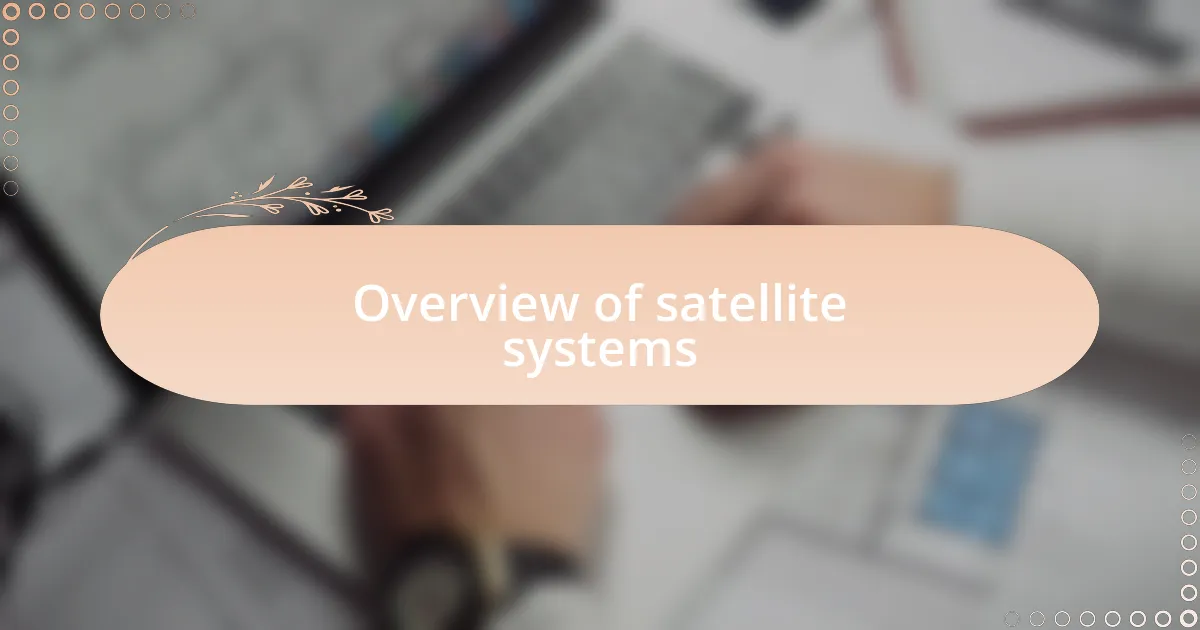
Overview of satellite systems
Satellite systems play a crucial role in modern telecommunications by enabling global communications, broadcasting services, and data transmission. I remember the first time I saw a satellite dish; it felt like a piece of the future had landed in my backyard, connecting me to far-flung corners of the world. Isn’t it fascinating how a small device can link us to countless networks?
There are several types of satellite systems, including geostationary satellites that remain fixed over the same spot on Earth, and low Earth orbit satellites that move rapidly, providing different advantages for specific applications. When I worked on a project involving low Earth orbit satellites, I was struck by their ability to offer lower latency, which is a game-changer for applications like live video calls and real-time data services. Have you ever thought about how latency can impact our everyday online experiences?
In addition to their operational types, satellite systems are equipped with sophisticated technology that allows for high-capacity data transmission and secure communication. I recall a moment during a maintenance check when I learned about the intricacies of signal processing; it was a real eye-opener to understand the layers of technology working tirelessly behind the scenes to keep us connected. Isn’t it impressive to realize just how much engineering goes into making communication seamless?
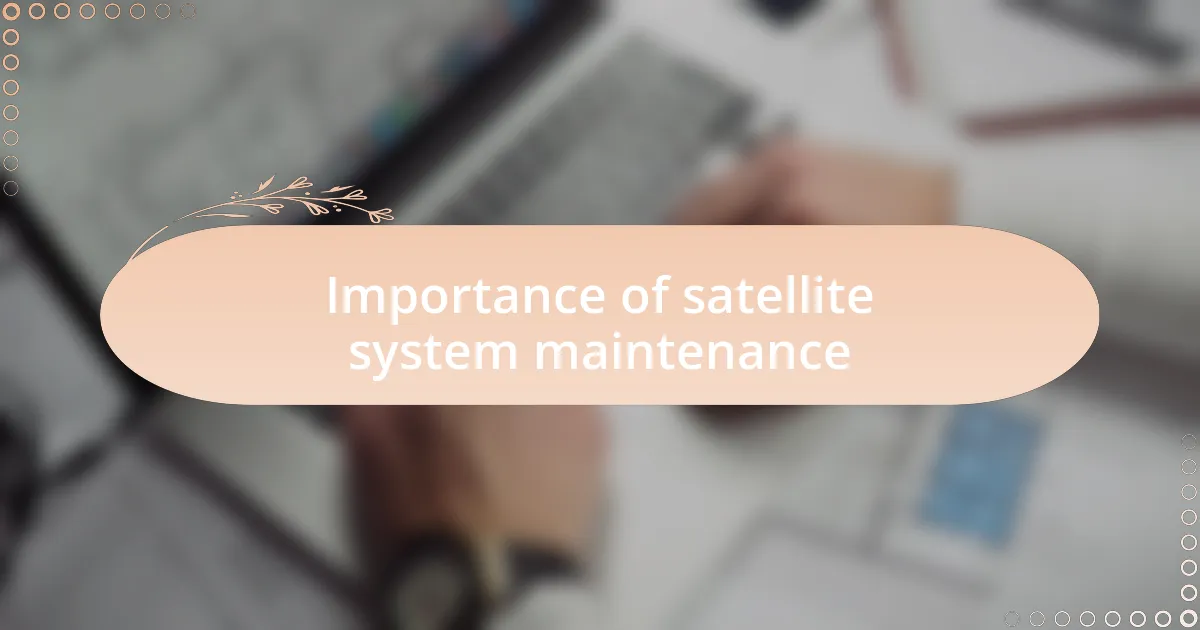
Importance of satellite system maintenance
Maintenance of satellite systems is essential for ensuring reliable communication and data transmission. I’ve often marveled at how a simple software update can enhance the performance of a satellite, significantly improving the quality of services we often take for granted. Have you considered the intricate dance of technology that keeps our connections strong and steady?
Regular maintenance not only extends the life of satellite systems but also prevents costly downtime. I recall a time when a minor oversight during maintenance led to a temporary disruption in service; it reminded me just how crucial these checks are. Isn’t it surprising how a small issue can snowball into a significant problem if not addressed promptly?
In my experience, proactive maintenance checks can catch potential failures before they happen, saving time and resources in the long run. When I participated in a comprehensive inspection of a satellite system, I learned how vital it is to stay ahead of the curve; it felt like we were safeguarding the very backbone of communication. What if more people realized the tangible benefits of this careful upkeep?
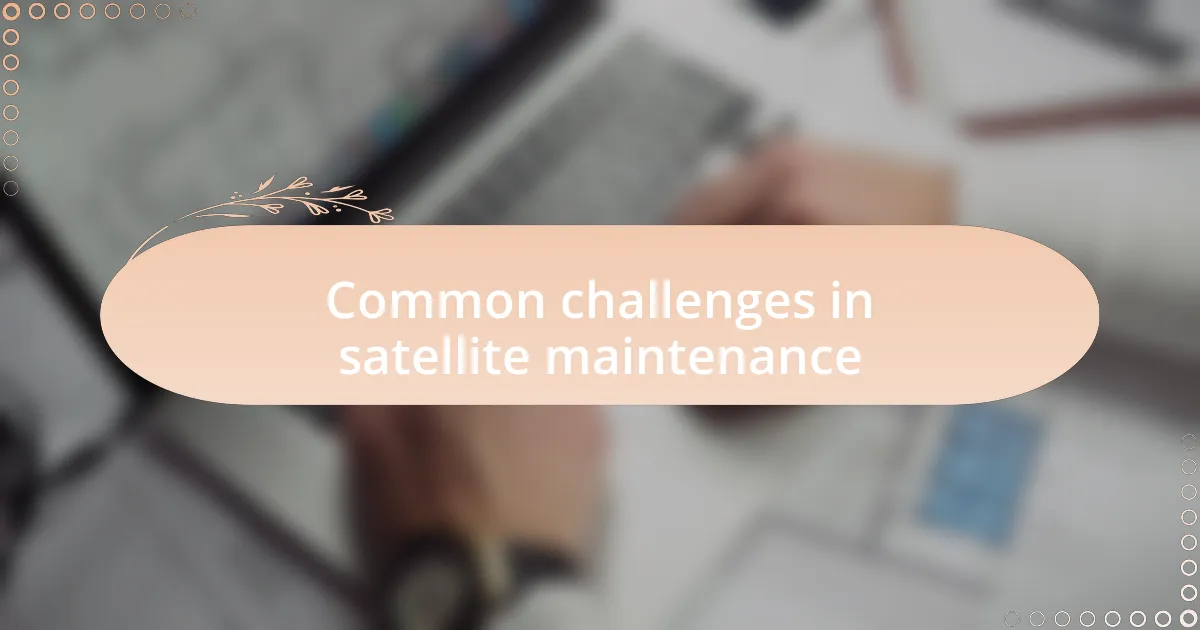
Common challenges in satellite maintenance
Maintaining satellite systems comes with its fair share of challenges. One that stands out to me is the unpredictable nature of space environments. For instance, I remember a time when we had to recalibrate a satellite due to unexpected solar weather, which not only delayed our schedule but also invoked a sense of urgency. Isn’t it fascinating how cosmic events can directly impact our technology?
Another common hurdle is keeping up with technological advancements. During a recent project, I observed how quickly new software and hardware solutions emerge, creating a need for constant training and adaptation. Have you ever felt overwhelmed by the rapid pace of innovation? I know I have, and it’s crucial that maintenance teams stay informed and agile to integrate these improvements effectively.
Lastly, communication between teams can often be a challenge. I recall working with various departments that had differing priorities, which sometimes led to misaligned goals during maintenance tasks. Isn’t it interesting how teamwork can either propel us forward or create stumbling blocks? Establishing clear communication pathways significantly lessens these risks and improves overall efficiency.
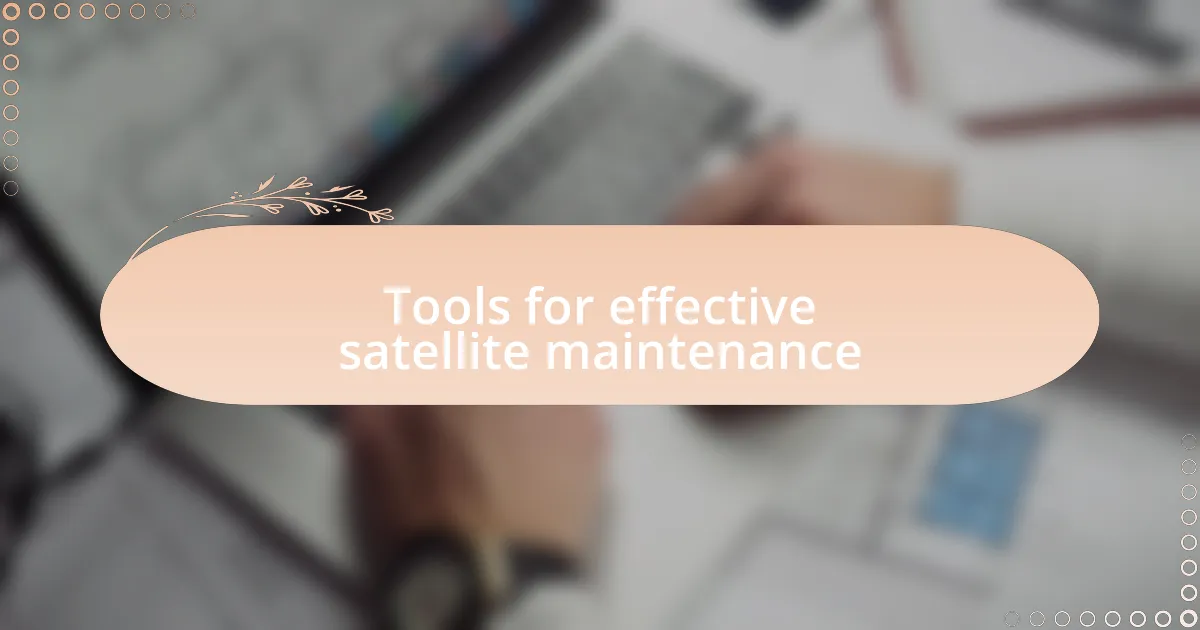
Tools for effective satellite maintenance
When it comes to tools for effective satellite maintenance, one of my favorites is the use of diagnostic software. I remember being on a maintenance team when we deployed a new tool that could predict satellite malfunctions before they happened. The first time it saved us from a looming issue, I felt a wave of relief wash over me. Isn’t it remarkable how the right technology can give us a lifeline in the harsh environment of space?
Another essential tool I advocate for is remote monitoring systems. These systems allow us to keep a constant eye on satellite health from the ground, minimizing the need for physical inspections. I once witnessed a scenario where we detected a power fluctuation early, allowing us to adjust parameters and prevent potential damage. Have you ever realized you could avert a crisis simply by having the right eyes on the situation?
Finally, don’t underestimate the value of a well-equipped ground station. In my experience, having access to advanced antennas and communication tools significantly enhances our ability to maintain satellites effectively. I recall a time when our ground station facilitated real-time communication during an on-orbit troubleshooting session. It truly underscored for me how critical these tools are in bridging the gap between the complexities of space and the operational efficiency we strive for.

Best practices for satellite upkeep
Best practices for satellite upkeep include regular health checks and preventive maintenance routines. I remember a time when I was part of a team that documented our maintenance schedules meticulously. Those short weekly checks, surprisingly, made a world of difference. It often left me wondering how many potential issues we sidestepped simply by being proactive.
Another critical practice is staying updated with the latest satellite technology and industry standards. During one mission, we implemented an upgrade during our routine maintenance, which enhanced our satellite’s data processing capabilities significantly. It was exhilarating to see how modernization can breathe new life into existing systems. Have you ever felt that rush of accomplishment when a small upgrade opens up vast possibilities?
Documentation plays a pivotal role in satellite upkeep as well. I fondly recall a project where meticulous record-keeping allowed us to trace a recurring issue back to a specific sensor malfunction. There’s something incredibly satisfying about piecing together information like a detective. It’s a reminder of how systematic approaches can illuminate solutions we might overlook.
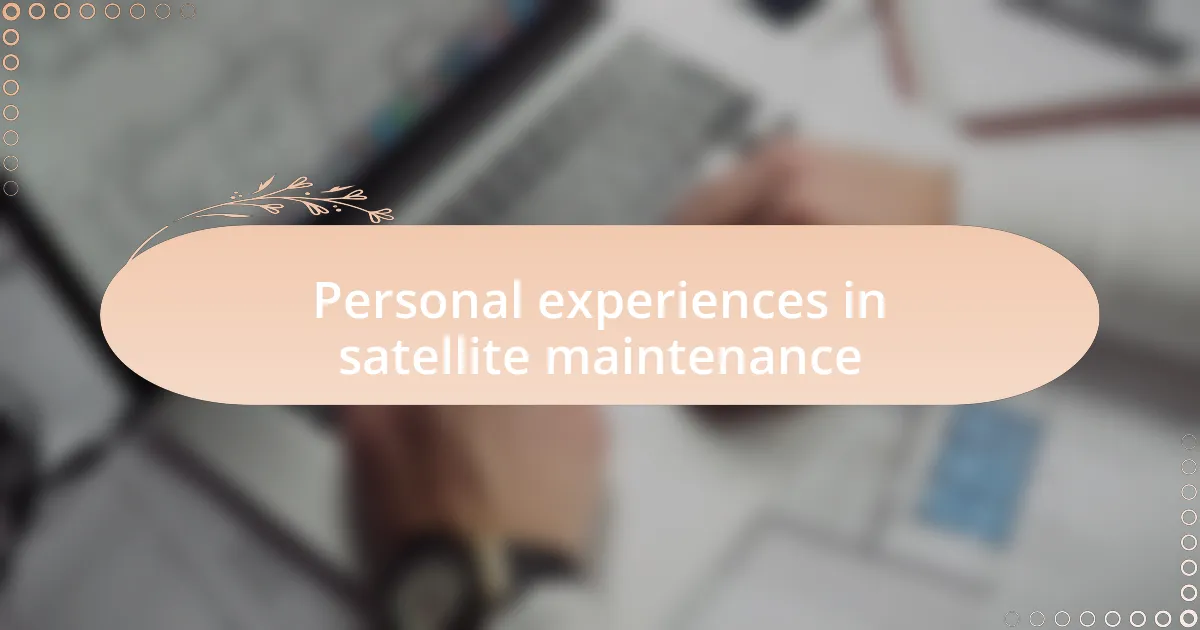
Personal experiences in satellite maintenance
When I first started working in satellite maintenance, I quickly learned the importance of hands-on experience. One particular day, a small oversight during a routine inspection led to a major delay in our launch schedule. That incident taught me how critical attention to detail is. Have you ever faced a minor issue that escalated because it wasn’t addressed? I know that feeling all too well.
One of the most memorable moments in my career was troubleshooting a communication glitch during a live test. The adrenaline was pumping as I worked alongside my team, narrowing down the potential causes. Finally isolating the problem was exhilarating, reinforcing the bond we shared through shared triumph and frustration. It was in those intense moments that I truly understood the depth of collaboration in our field.
Reflecting on my experiences, I can’t stress enough how invaluable mentorship has been in my journey. Learning from a seasoned technician helped me avoid many pitfalls. I still remember the advice about cleverly utilizing simulation tools for practice—it made all the difference. Have you ever had a mentor who shaped your professional outlook? That kind of guidance transforms not just your skills but also your confidence in handling challenges.
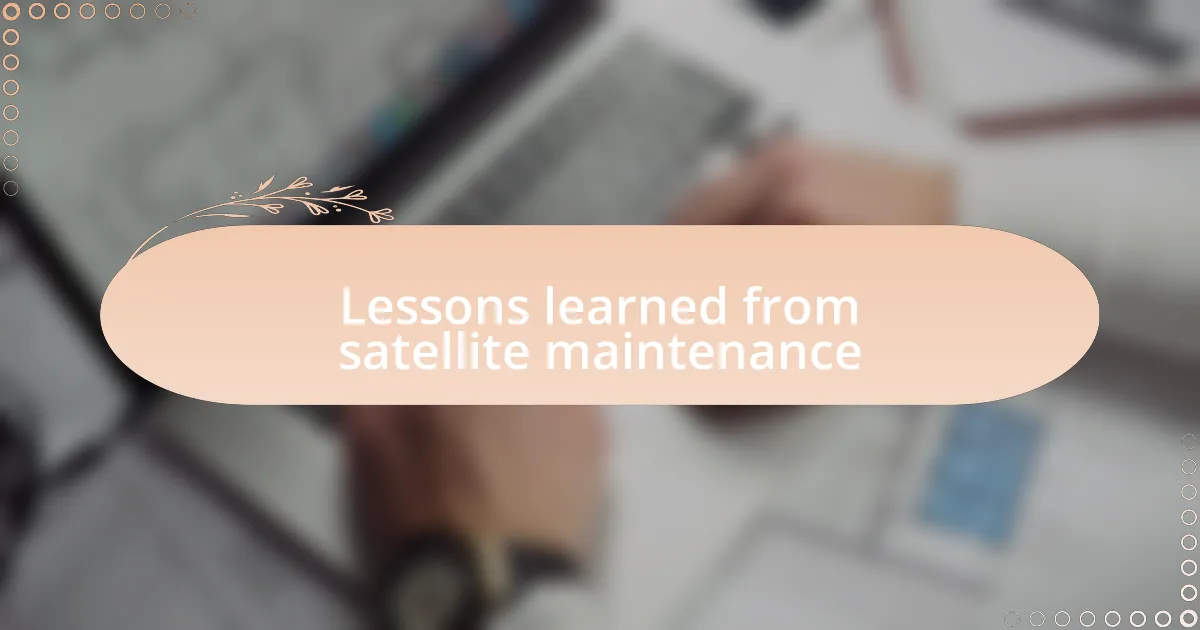
Lessons learned from satellite maintenance
One fundamental lesson I gathered from satellite maintenance is the necessity of thorough documentation. I recall a time when a lack of proper records led to confusion during a major system update. It struck me how critical it is to have clear logs for each component and procedure. Isn’t it frustrating to revisit past issues without a solid reference?
Another important takeaway is the role of proactive problem-solving. During one maintenance session, I encountered an unexpected failure of a subsystem. Instead of panicking, I took a breath and started analyzing all possible contingencies. This experience underscored the value of maintaining a calm mindset; it allows you to approach problems methodically rather than reactively. Have you ever found that a clear head helps you see solutions more easily?
Lastly, I’ve learned the importance of continuous learning in satellite maintenance. I remember attending a workshop on advanced telemetry systems that completely changed my understanding of satellite diagnostics. That day, I realized that being up-to-date with the latest technologies isn’t just beneficial—it’s imperative for success. How often do we think we’re done learning when, in reality, the field is always evolving? Embracing that journey keeps me engaged and ready for new challenges ahead.